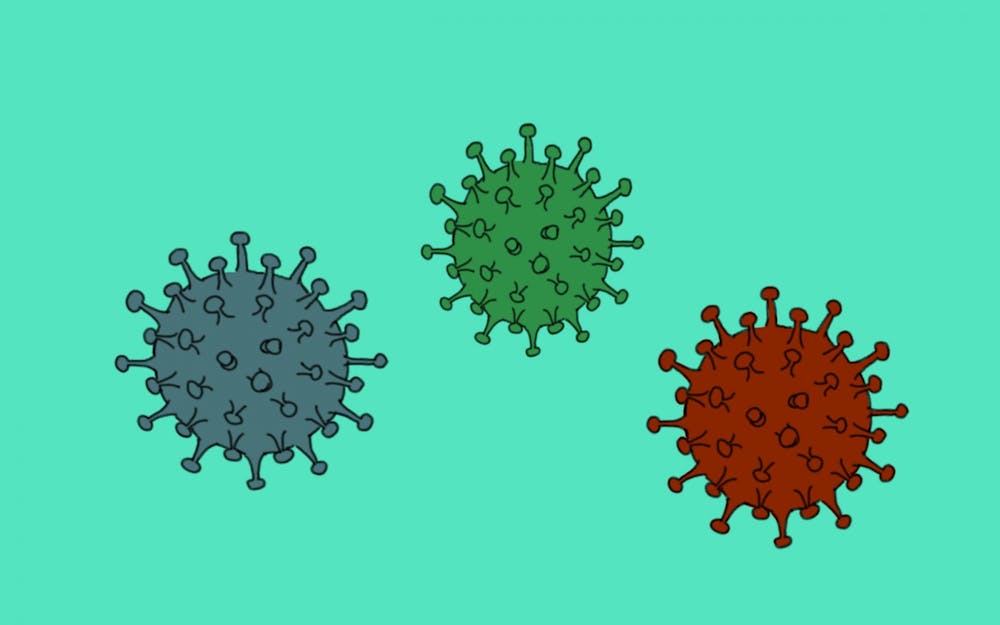COVID-19 cases are rising throughout the U.S., and new strains are emerging. As of April 12, the U.S. is recording an average of 68,960 new cases per day this week, compared to 53,703 daily cases three weeks ago, according to NPR. Monroe County remains classified as yellow for the third week in a row, indicating increasing cases.
Here’s what you need to know about the three major strains of coronavirus.
What are the variants?
The Centers for Disease Control and Prevention has identified five variants of concern in the U.S., but three are most prevalent.
B.1.1.7 was initially detected in the United Kingdom in September 2020 and in the U.S. last December. It makes up 20,915 of reported COVID-19 cases in the U.S. as of April 10, according to the CDC, and has become the dominant strain of COVID-19 in the U.S. Indiana has seen 263 of these cases, according to the CDC.
B.1.351 was first reported in South Africa in December 2020 and identified in the U.S. in January. As of April 10, there have been 453 reported cases in the U.S., two of which reported in Indiana.
P.1. was initially identified in travelers from Brazil who were tested during routine screenings at a Japan airport in January. The variant was detected in the U.S. later that month. There have been 497 reported cases in the U.S. as of April 10, and four of those have been in Indiana.
How are variants detected?
Thomas Duszynski, epidemiology education director at IU-Purdue University Indianapolis’ Richard M. Fairbanks School of Public Health, said variants can be detected with a normal COVID-19 test.
“They can look at the DNA fingerprint of that particular virus and compare it to the other DNA fingerprints of the other viruses’ strains that they’ve found and say, ‘OK, what is this?’” he said.
How dangerous are variants?
While studies suggest variants are not more deadly and do not cause more severe symptoms than the original COVID-19 strain, they do suggest the variants are more contagious.
Marco Ajelli, associate professor at the IU-Bloomington School of Public Health, said the U.K. variant is 40% to 60% more transmissible than the original COVID-19 strain.
The P.1. variant, like the others, is still being studied, but health officials told Chicago’s WGN TV in March they believe the variant is more contagious than other strains.
Reinfection is also a concern. The California Department of Public Health said the P.1. and B.1.351 variants have a moderate decreased response to antibodies––proteins in the blood that fight diseases by attacking harmful bacteria ––generated by a previous infection or vaccine.
Ajelli said low cross-protection, or protection from viral infections given to someone by a prior inoculation, can lead to reinfection.
“It means that these variants are so different from the original one that even a person that was infected with the original strain now can be reinfected by the variants,” he said.
How effective are vaccines at preventing variant spread?
Moderna: In a news release from Jan. 25, Moderna said its vaccine was effective against all of the key variants. However, the National Institutes of Health launched a clinical trial on March 31 to evaluate its effectiveness against the South African variant.
Pfizer: Earlier this month, Pfizer and BioNTech said the vaccine was 91.3% effective at preventing symptomatic cases and 95% effective at preventing severe cases. They also provided data suggesting the vaccine works against the South African variant.
Johnson & Johnson: Data released throughout January and February show that the vaccine works against all variants. Although it was only said to be 57% effective at preventing symptomatic illness in South Africa, where the B.1.351 variant was first detected, ABC News said in February the Johnson & Johnson vaccine was still “highly effective” at preventing severe disease there.
What do students think?
IU freshman Melanie Taylor said she thinks social distancing and masks should still be taken seriously. To stay safe, she said she has received her first vaccine dose and chooses carefully who she spends time with.
Taylor said she's worried about the COVID-19 variants.
"It's concerning to know that this virus can continue to vary,” Taylor said.
If counties, towns and countries continue to open too soon, she said, the pandemic could continue to affect even more families and businesses.
What can I do to stay safe?
Ajelli, the associate professor at IU-Bloomington's School of Public Health, said the only way to get rid of the variants is to stop transmission.
“The only option is to vaccinate people, and when we have enough people that are vaccinated all around the globe –– not just in the U.S. or in a certain country but in the world –– the virus will have less chance of infecting other people and so it will have less chance of mutating,” he said.
While waiting for the opportunity to be vaccinated, Duszynski said people should still practice caution through social distancing and face coverings.
“The vaccine, the masks, the hand hygiene and the physical distancing, those are the path out of the pandemic world,” he said.
Correction: A previous version of this story incorrectly identified Marco Ajelli as an associate professor at IUPUI instead of IU-Bloomington.




